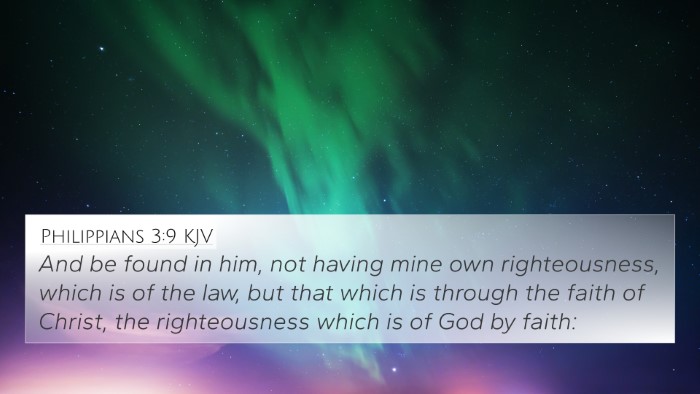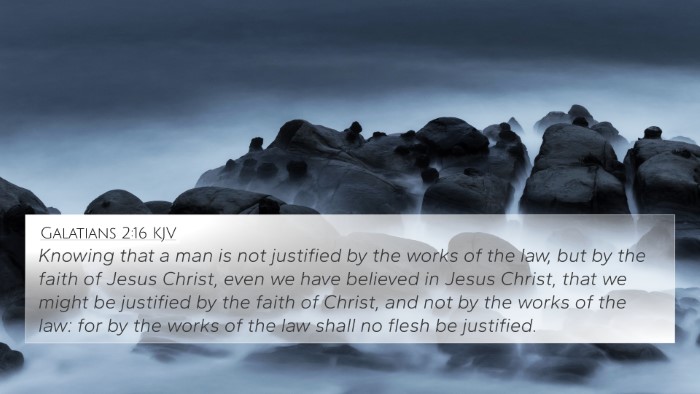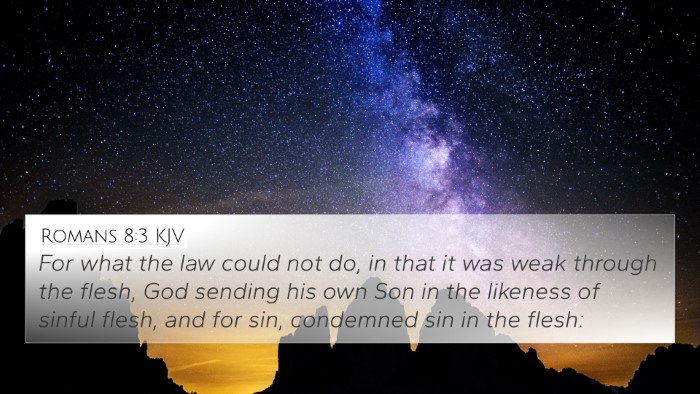Understanding Romans 3:28
Romans 3:28 states, "For we hold that one is justified by faith apart from works of the law." This verse encapsulates a critical doctrine of Christian faith concerning justification—being declared righteous before God.
Overview of Justification by Faith
The teaching found in this verse highlights the core tenet of salvation that Paul emphasized throughout his letters. Here, Paul asserts that justification is not achieved through adherence to the law but is a gift that comes through faith in Jesus Christ.
Commentary Insights
Insights from renowned commentaries shed light on the depth of this verse:
-
Matthew Henry:
Henry emphasizes that justification by faith alone means that believers are not made righteous by their works, but they are counted righteous by God's grace through faith. This doctrine clarifies that human efforts do not merit salvation.
-
Albert Barnes:
Barnes discusses the implications of being justified 'apart from the works of the law.' He highlights that this signifies a departure from relying on legalistic observance, bringing emphasis to the necessity of faith for justification.
-
Adam Clarke:
Clarke notes the revolutionary nature of this teaching during Paul's time. He articulates that the Jewish reliance on the law is replaced by faith in Christ, which opens a new path of relationship with God for both Jews and Gentiles.
Thematic Connections to Other Scriptures
Romans 3:28 is part of a broader theological discourse in the New Testament that resonates with several passages. Here are important Bible verse cross-references that provide connections between Bible verses:
- Galatians 2:16: "Yet we know that a person is not justified by works of the law but through faith in Jesus Christ..." This verse reiterates the principle of justification by faith emphasized by Paul.
- Ephesians 2:8-9: "For by grace you have been saved through faith, and that not of yourselves; it is the gift of God, not of works, lest anyone should boast." This passage powerfully underscores that salvation is a divine gift.
- Philippians 3:9: "...and be found in him, not having a righteousness of my own that comes from the law, but that which comes through faith in Christ..." Paul again contrasts faith with the works of the law.
- Titus 3:5: "He saved us, not because of works done by us in righteousness, but according to his own mercy..." This emphasizes that divine mercy, rather than human merit, is the basis of salvation.
- Hebrews 11:6: "And without faith, it is impossible to please him..." This highlights the essential nature of faith in approaching God.
- John 3:18: "Whoever believes in him is not condemned..." This verse indicates that faith is the key to being justified before God.
- Romans 5:1: "Therefore, since we have been justified by faith, we have peace with God through our Lord Jesus Christ." This connects the concept of faith to the peace it brings in one’s relationship with God.
Theological Implications
Romans 3:28 displays profound theological implications that align with the extensive narrative of salvation throughout the Bible. The core theme is the consistent affirmation that faith in Christ supersedes works of the law. Below are themes worth noting in relation to justification:
- Grace vs. Works: The stark contrast between grace through faith and the works of the law emphasizes that salvation is a divine initiative, removing human boasting.
- Faith as the Means of Salvation: As seen throughout Paul’s epistles, faith becomes the sole condition for receiving God’s righteousness.
- Covenantal Relationships: This verse indicates a shift from the Old Covenant of law to the New Covenant of grace through Christ.
Practical Applications
Understanding Romans 3:28 and its accompanying commentaries shapes a believer's perspective toward faith and works. Here are practical applications:
- Rest in Grace: Believers should embrace the understanding that their relationship with God is based not on their performance but on Christ’s work.
- Encourage Others: Share the liberating message of faith in Christ as the basis for justification, helping others to find peace with God.
- Study Cross References: Use tools for cross-referencing to deepen understanding of how various scriptures affirm the doctrine of justification by faith.
Conclusion
Romans 3:28 serves as a foundation to comprehend the essence of Christian faith. By engaging with accompanying commentaries and inter-Biblical dialogues, one can appreciate the profound truth that justification is a divine gift received through faith in Jesus Christ. The study of this verse alongside its parallels fosters a richer understanding of the overall Biblical narrative concerning salvation.
For those seeking meaningful connections in scripture, employing a Bible cross-reference guide or using a Bible concordance will facilitate a comprehensive study that links the overarching themes of faith, grace, and redemption.




















